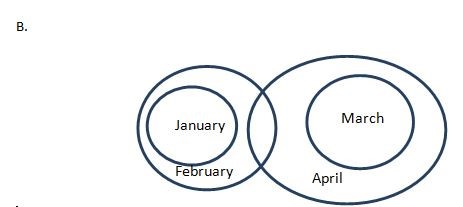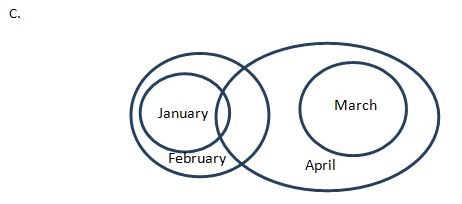Question
Statements:All Januarys are Februarys. No
February is March. All marches are Aprils. Conclusions: I. Some March are not Februarys. II. Some marches are Aprils. In each of the questions below are given three statements followed by three conclusions numbered I and II. You have to take the given statements to be true even if they seem to be at variance with commonly known facts. Read all the conclusions and then decide which of given conclusions logically follows from the given statements disregarding commonly known facts. Give answerSolution
No February is March (E) ⇒ Conversion ⇒ No march is a February (E). ⇒ I.I. ⇒ some marches are not Februarys (O). Hence, conclusion I will follow. All marches are Aprils (A) ⇒ Conversion ⇒ some marches are Aprils (I). Hence, conclusion II will also follow. ALTERNATE METHOD: All possible cases: 

 In all the cases, I and II follow.
In all the cases, I and II follow.
Which team won the 2024 edition of the Santosh Trophy, securing a record-extending 33rd title by defeating Kerala in the final?
Syed Modi India International is organised in which sporting event?
U.S. Open is a grand slam tournament, which game is related to it?
Which of the following contains small droplets of liquid or particles of solid dispersed in a gas?
Which of the earlier agricultural insurance schemes in India was replaced by the Pradhan Mantri Fasal Bima Yojana (PMFBY) in 2016?
Who was awarded the Man of the Match in the final of ICC Asia Cup 2023 for his outstanding performance?
Who among the following was the first president of IOC?
The first electronic voting machine was used in
Which Articles of the Indian Constitution describe Fundamental Rights?
Which of the following options accurately describes the primary focus areas of UNESCO and WHO, respectively?



